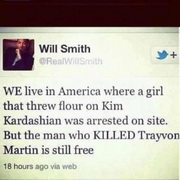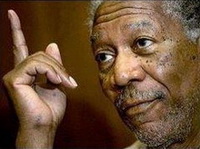The 2006 interview with Morgan Freeman (see box on the right) has gone viral across social networks such as Facebook, with Freeman proponents singing his praises and crediting him with profound wisdom. As usual, such quotes are presented out of context. Freeman’s most crucial closing argument was omitted. He had gone on to explain that the point was to put an end to race-consciousness, to stop habitually attaching color labels to people—stop racializing and race-profiling. Without this closing point, his message becomes a twisted, oversimplified alternative sound bite, perfectly suited to the masses and to mindless reposting sans scrutiny: stop talking about racism and it will go away of its own accord.
On face value, putting aside the fact that this is a distorted version of Freeman’s original message, there are some interesting observations to be made from a sociohistorical perspective.
The fact that African Americans themselves are endorsing and reposting this misquote raises a lot of questions. Is this a milestone reflecting the achievements of African Americans in their fight against the once prevalent tide of racism against them? Have they now sufficiently established their place in American society so that they can no longer be easily marginalized? Are they now speaking from a position of relative “privilege” to be able to refuse to highlight the problem? Has the antiracism movement gained sufficient critical mass that they can now afford to ignore racism? While there may be some truth to to the idea of squelching racism by refusing to feed it, such a philosophy is a “luxury,” even if it is hard-earned and not always successfully applied across the board.
Why do I, as an Asian in the West, not share this sentiment nor feel sufficiently secure to rest in such “complacency?”
Depending on who you ask, the reality of racism can be entirely different for Asian Americans or Asians anywhere in the West. This may be attributable to the fact that Asians have historically not had to fight for or were unable to fight for their rights in the same manner as African Americans due to numerous historical factors, such as their smaller numbers and an entirely different form of disenfranchisement (see below). Consequently, Asians are still being subjected to a different form of lingering racism that is flying under the radar—most people are surprised to hear that Asians feel discriminated against or subjected to racism in this day and age, because Asians are supposedly “respected and admired” as model citizens.
Rosa Parks’ actions may have sparked riots in 1955, but laws barring ethnic-Chinese immigration (the Magnuson Act) remained intact until 1965. As recently as 2001, in states such as Wyoming, legal statutes were still in force barring any ethnic Chinese (including US citizens) from owning property in that state. To paraphrase yet another fake tweet attributed to Will Smith, “we live in a day an age where President Obama gets all upset by the Martin Trayvon killing, whereas in the case of a court-proven racially motivated murder, the killers of Vincent Chin walk away with a mere $3000 fine because politicians won’t go near the issue.”

Another fake tweet that has gone viral
Traditionally, most Asians in the West elected to emigrate and were not kidnapped or brought there by the slave trade per se, although they have been regarded as undesirables and their ancestors were often tricked into voluntary slavery or “indentured labor.” Alongside their rejection and marginalization by the white majority (numerous race-based laws, harsh restrictions on immigration and near-genocidal policies), they were also granted tentative citizenship with limited rights—they were allowed to exist quietly and remain in the community as long as they did not step out of line, such as by testifying in court to racial atrocities committed against them. They were in fact barred from doing so, which gave rise to the term, “not a Chinaman's chance.”
However, Asians were/are seldom accepted as truly American. To this day, they are confronted with Perpetual Foreigner Syndrome, largely portrayed by the media and perceived by the general public as foreigners by default. Male Asian Americans are yet to be cast in major Hollywood roles that do not portray them as inherent foreigners with martial-arts skills. They continue to be openly stereotyped, patronized and called names in the mainstream media—take the case of basketball superstar Jeremy Lin, who was the subject of the following taunts openly used against him: “two-inch penis,” “fortune cookie,” “yellow mamba,” “kung fu grip,” “from Taiwan (he was born in the US),” “chink in the armor,” “FOB (Fresh Off The Boat).”
As many Asians in the West will readily attest, it's not just the taunts. The problem is that the perpetrators of such nonsense do not regard their actions as taunts. The expectation is that Asians will not and should not be confrontational or make an issue out of it. The prevalent notion is that Asians are all inclined to be Ghandiesque and in a state of eternal thankfulness that they’re no longer in Asia. A standard reaction to any protests by Asians is that they should stop complaining about their treatment, or simply “go back to [INSERT COUNTRY] where you came from,” where there are “no human rights.” Ask virtually any Asian, and they’ll tell you there is most definitely an unwritten social contract at play.
So here’s the other side of the coin: in the words of the late Rev. Martin Luther King, Jr.: Our lives begin to end when we stop talking about things that matter. It’s all very nice to wish things away by ignoring them, but there also comes a time when it’s quite necessary to speak up and say: STOP! This is unacceptable!
Since I am subjected to racial remarks on a regular basis, and since racism against Asians seems to be generally acceptable and perpetrated “unawares,” I will continue to speak up when anyone thinks to openly denigrate me by virtue of my skin color and their perceptions of race. I will not be silenced. Racism does not go away of its own accord—it never has!






